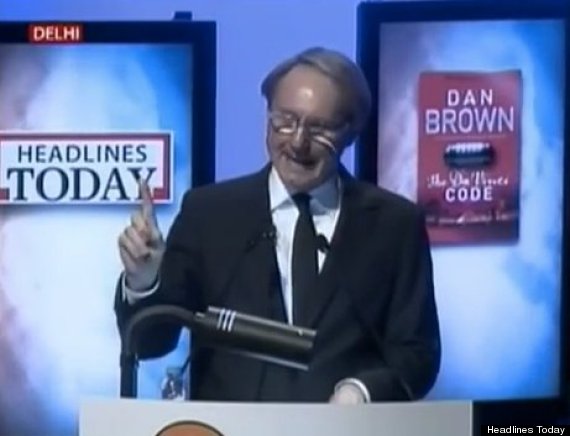
Author Dan Brown has sparked plenty of intellectual debate during his career as a novelist by exploring the relationship between science and religion.
While delivering the Penguin Annual Lecture in India this week, the writer revealed that he believes that the lines between science and religion are actually starting to “blur.”
“Science and religion are partners. They are two different languages telling the same story . . . While science dwells on the answers, religion savors the questions,” Brown said, according to The Hindu.
“Ironically, we now turn to God for only for a handful of existential questions which science has never been able to answer like ‘Where did we come from? Why are we here? And what happens when we die?” he continued.
Brown has been struggling with these questions for quite some time. His father was a mathematics professor and his mother was a devout Christian and a church organist. For the lecture, Brown brought along two old license plates from his parents’ cars. His dad’s read METRIC, while his mother’s read KYRIE, meaning Lord, according to the Times of India. This contrast in views reportedly set the scene for a lifetime of investigations.
As a teen, Brown began to question apparently irreconcilable contradictions between religion and science that he found at his mother's church. But as he grew older, he began to understand that both ways of examining the world were important.
The ultimate question for him is how to celebrate and further the achievements of science without losing the beauty of faith.
“The world is getting smaller everyday and now, more than ever, there is enormous danger in believing that we are infallible. That our version of the truth is absolute and that everyone who does not think like we do is wrong and therefore our enemy,” Brown said.

The bestselling novelist has 200 million books in print and has published in 52 different languages, according to his website. He’s currently writing a new book and working with Columbia Pictures to turn his most recent novel into a movie.
His controversial “The Da Vinci Code” sparked criticism from Christian denominations after it suggested that Mary Magdalene had given birth to Jesus’ son. The book provoked much debate and continues to inspire theories about the role of Mary Magdalene in the early church.
During the lecture, Brown spoke to a full house of audience members. He was chosen as the eighth speaker to give a presentation at Penguin Random House India’s annual lecture series. Previous lecturers included the Dalai Lama, writer Thomas Friedman, and Bollywood actor Amitabh Bachchan, according to The Hindu.
Related
Before You Go












